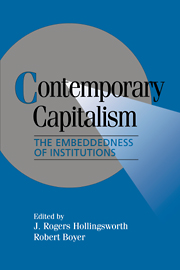Late Soviet Britain
Why Materialist Utopias Fail
£26.99
- Author: Abby Innes, London School of Economics and Political Science
- Date Published: September 2023
- availability: Available
- format: Paperback
- isbn: 9781009373630
£
26.99
Paperback
Other available formats:
Hardback, eBook
Looking for an inspection copy?
This title is not currently available on inspection
-
Why has the United Kingdom, historically one of the strongest democracies in the world, become so unstable? What changed? This book demonstrates that a major part of the answer lies in the transformation of its state. It shows how Britain championed radical economic liberalisation only to weaken and ultimately break its own governing institutions. The crisis of democracy in rich countries has brought forward many urgent analyses of neoliberal capitalism. This book explores for the first time how the 'governing science' in Leninist and neoliberal revolutions fails for many of the same reasons. These systems may have been utterly opposed in their political values, but Abby Innes argues that when we grasp the kinship in their closed-system forms of economic reasoning and their strategies for government, we may better understand the causes of state failure in what remains an inescapably open-system reality.
Read more- An original and provocative book which seeks to comprehend how it was possible for the United Kingdom, one of the longest established and wealthiest democracies in the world, to find itself in a crisis of system legitimacy
- Transforms understandings of neoliberalism through a systematic comparison of the political economy of Soviet communism with that of a neoliberal state, thus comparing the two dominant materialist utopias of the Twentieth Century
- Argues that liberal reformers have failed to recognise the essential importance of the state's mediation of the capitalist economy in a democratic society, just as the many virtues of markets became doctrinally taboo in the Soviet system
Reviews & endorsements
'Abby Innes is one of the most original and provocative analysts of politics in Britain. Her inventive, erudite explorations of both right and left and the many pathologies that make them mimic each other explain so many of the problems which beset the country today.' Rory Stewart, Director of Give Directly, former UK Secretary of State for International Development and co-presenter of the podcast The Rest is Politics
See more reviews'Innes has written a creative, original and deeply insightful account of the modern British state. In comparing the utopianism of neo-liberal thinking and policymaking to that of the Soviet system, she shows how the attempt to translate closed theoretical models into practice leads to weakened forms of governance. This book is critical reading for those trying to understand both contemporary Britain and the nature of modern statecraft.' Jane Gingrich, Professor of Social Policy at the Department of Social Policy and Intervention (DSPI), University of Oxford
'The neoclassical project of withdrawing the state from the market ironically rested upon the same fallacy as Soviet planning: that a self-regulating material utopia was possible. The result in both cases was stifling bureaucratic overreach, economic stagnation and system crisis, as the utopia could never be realised. That which is opposite is really the same. Innes offers us more than an analogy of decline. She gives us a forensic dissection of the same pathology in two quite different bodies. A bold and important book.' Mark Blyth, Professor of International Economics at the Watson Institute for International and Public Affairs, Brown University, Rhode Island
'Political dogmatism kills, no matter what its ideological shape and pedigree. Abby Innes has given the most meticulous articulation of an insight that, through Václav Havel's writing, nourished the insurrections against the totalitarian regimes in Eastern Europe. Thanks to her merciless dissection of the totalitarian logic of neo-liberalism and her scrupulous account of the damage it has inflicted on Britain, we should be better equipped to find a way out. In Late Soviet Britain, Abby Innes has recast the Enlightenment project by cleansing it of its modernist hubris. Emancipation without utopia requires politics without dogma, and this book charts a new road ahead.' Albena Azmanova, Author of The Scandal of Reason and the multiple-award-winning Capitalism on Edge
Customer reviews
Not yet reviewed
Be the first to review
Review was not posted due to profanity
×Product details
- Date Published: September 2023
- format: Paperback
- isbn: 9781009373630
- length: 320 pages
- dimensions: 228 x 153 x 21 mm
- weight: 0.59kg
- availability: Available
Table of Contents
Introduction: the Gods that failed
Part I. The Materialist Utopias:
1. Rationality and closed-system reasoning
2. General equilibrium and the balanced plan
3. On bureaucracy
4. On 'organised forgetting' in the governing science
Part II. Britain's Neoliberal Revolution:
5. The new public management, or Enterprise planning in capitalist form
6. Quasi-markets in welfare, or The non-withering state
7. Tax competition, or The return of regulatory bargaining
8. Efficient markets and climate change, or Soviet cybernetics 2.0
Part III. The Rise and Fall of the Neoliberal 'Movement Regime':
9. Neoliberalism: the Brezhnev years
10. A politics for the end of time.
Sorry, this resource is locked
Please register or sign in to request access. If you are having problems accessing these resources please email [email protected]
Register Sign in» Proceed
You are now leaving the Cambridge University Press website. Your eBook purchase and download will be completed by our partner www.ebooks.com. Please see the permission section of the www.ebooks.com catalogue page for details of the print & copy limits on our eBooks.
Continue ×Are you sure you want to delete your account?
This cannot be undone.
Thank you for your feedback which will help us improve our service.
If you requested a response, we will make sure to get back to you shortly.
×








